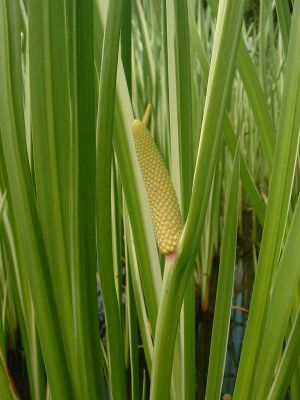Note: This is a project under development. The articles on this wiki are just being initiated and broadly incomplete. You can Help creating new pages.
Difference between revisions of "Acorus calamus - Jatila"
(→Commonly seen growing in areas) |
(→Mode of Propagation) |
||
| Line 37: | Line 37: | ||
==Where to get the saplings== | ==Where to get the saplings== | ||
==Mode of Propagation== | ==Mode of Propagation== | ||
| − | {{Propagation| | + | {{Propagation|rhizomes}}. |
==How to plant/cultivate== | ==How to plant/cultivate== | ||
Revision as of 12:58, 16 April 2018
Acorus calamus (also called sweet flag or calamus, among many common names) is a tall perennial wetland monocot of the Acoraceae family, in the genus Acorus. In spite of common names that include the words "rush" and "sedge", it is neither a rush nor sedge.The scented leaves and more strongly scented rhizomes have traditionally been used medicinally and to make fragrances, and the dried and powdered rhizome has been used as a substitute for Ginger, Sthula tvak (cinnamon) and nutmeg.
Contents
Uses
epilepsy, oedema, scrotal enlargement, skin diseases, headache, alopecia, wound, Diarrhea, eye diseases, acid gastritis, heart-diseases[1]
Parts Used
Chemical Composition
Contains volatile oils, flavonoids, apigenin, luteolin, quercetin, kaempferol, tiliroside, triterpene glycosides including euscapic acid and tormentic acid, phenolic acids, and 3%–21% tannins.[2]
Common names
| Language | Common name |
|---|---|
| Kannada | athibaje, baje, baje gida |
| Hindi | bacc, bach, baj |
| Malayalam | vaembu, vashampa |
| Tamil | akaraveci, akkitam |
| Telugu | vadaja, vasa, wasa |
| Marathi | NA |
| Gujarathi | NA |
| Punjabi | NA |
| Kashmiri | NA |
| Sanskrit | bacha, bhadra, bhutanashini |
| English | Agrimony |
Habit
Identification
Leaf
| Kind | Shape | Feature |
|---|---|---|
| Simple | The leaves are divided into 3-6 toothed leaflets, with smaller leaflets in between |
.[3]
Flower
| Type | Size | Color and composition | Stamen | More information |
|---|---|---|---|---|
| Unisexual | 2-4cm long | Yellow | 5-20 | Flowers Season is June - August |
Fruit
| Type | Size | Mass | Appearance | Seeds | More information |
|---|---|---|---|---|---|
| 7–10 mm (0.28–0.4 in.) long pome | clearly grooved lengthwise, Lowest hooked hairs aligned towards crown | With hooked hairs | {{{6}}} |
Other features
List of Ayurvedic medicine in which the herb is used
- Vishatinduka Taila as root juice extract
Where to get the saplings
Mode of Propagation
How to plant/cultivate
Easily grown in most soils[21][22], preferring a calcareous soil. Thrives in a dry lightly shaded position[16], though it prefers full sun. Plants usually self-sow quite freely when growing in a suitable position[19]. The seeds are contained in burrs that can easily attach themselves to clothing or animal's fur, thus transporting them to a new area where they can germinate and grow.The cultivar 'Sweet scented' is popular in France for making tea because the whole plant is sweet scented and the flowers have a spicy apricot-like fragrance[4]
Commonly seen growing in areas
North temperate hemisphere, tropical Asia, Himalayas.
Photo Gallery
References
External Links
- Pages that are stubs
- Ayurvedic Herbs known to be helpful to treat epilepsy
- Ayurvedic Herbs known to be helpful to treat oedema
- Ayurvedic Herbs known to be helpful to treat scrotal enlargement
- Ayurvedic Herbs known to be helpful to treat skin diseases
- Ayurvedic Herbs known to be helpful to treat headache
- Ayurvedic Herbs known to be helpful to treat alopecia
- Ayurvedic Herbs known to be helpful to treat wound
- Ayurvedic Herbs known to be helpful to treat Diarrhea
- Ayurvedic Herbs known to be helpful to treat eye diseases
- Ayurvedic Herbs known to be helpful to treat acid gastritis
- Ayurvedic Herbs known to be helpful to treat heart-diseases
- Herbs with rhizome used in medicine
- Herbs with rooots used in medicine
- Herbs with common name in Kannada
- Herbs with common name in Hindi
- Herbs with common name in Malayalam
- Herbs with common name in Tamil
- Herbs with common name in Telugu
- Herbs with common name in Sanskrit
- Herbs with common name in English
- Habit - Herb
- Index of Plants which can be propagated by rhizomes
- Herbs that are commonly seen in the region of North temperate hemisphere
- Herbs that are commonly seen in the region of tropical Asia
- Herbs that are commonly seen in the region of Himalayas
- Herbs



